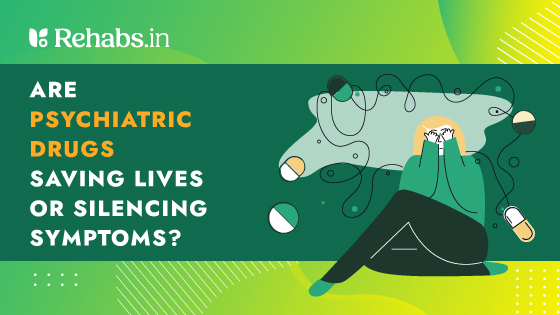Are Psychiatric Drugs Saving Lives or Silencing Symptoms?

In recent years, a growing debate has emerged around the effectiveness and role of psychiatric medications in treating mental health conditions. While many individuals report significant relief from symptoms through medications like antidepressants and mood stabilizers, others question whether these drugs address the underlying causes of mental illness or merely suppress symptoms.
In recent years, a growing debate has emerged around the effectiveness and role of psychiatric medications in treating mental health conditions. While many individuals report significant relief from symptoms through medications like antidepressants and mood stabilizers, others question whether these drugs address the underlying causes of mental illness or merely suppress symptoms.

Cruise’s comments sparked widespread controversy and were met with backlash from mental health professionals and advocates who emphasized the importance of evidence-based treatments for mental health conditions. In response, Brooke Shields defended her treatment choices in a New York Times op-ed, highlighting the seriousness of postpartum depression and the need for accessible treatment options. She later revealed in her memoir that Cruise privately apologized for his remarks.
This incident underscores the broader conversation about psychiatric medications: Are they essential tools for managing mental health, or do they risk oversimplifying complex emotional and psychological issues? As we delve deeper into this topic, we’ll explore the science behind these medications, their benefits and limitations, and the importance of a holistic approach to mental health care.
What Are Psychiatric Drugs and Do They Really Treat Mental Illness?
Psychiatric drugs are medications that help manage symptoms of mental health conditions like depression, anxiety, bipolar disorder, and schizophrenia. These medications are often prescribed by psychiatrists to reduce distress, improve functioning, and stabilize mood or thoughts.
There are different types of psychiatric drugs depending on the condition being treated. Some of the most common include:
- Antidepressants (like SSRIs or SNRIs) for depression and anxiety
- Antipsychotics for conditions like schizophrenia or severe bipolar disorder
- Mood stabilizers (such as lithium) for bipolar disorder
- Anti-anxiety medications (like benzodiazepines) for short-term relief of intense anxiety
- Stimulants for conditions like ADHD
But here’s an important question: Do these drugs actually treat mental illness or just mask the symptoms?
Most psychiatric medications work by affecting brain chemicals called neurotransmitters like serotonin, dopamine, or norepinephrine. These chemicals are involved in mood regulation, motivation, sleep, and emotions. When they’re out of balance, it can lead to mental health issues (Stahl, 2013).
However, psychiatric medications do not “cure” mental illnesses in the same way antibiotics cure infections. They help reduce symptoms, often making it easier for someone to function, go to work, sleep better, or engage in therapy. Think of them like stabilizers. They don’t build the house, but they help hold up the walls so the deeper work can happen.
It’s also important to know that the causes of mental illness are complex. They involve a mix of genetics, brain chemistry, life experiences, stress, and environment (Insel, 2009). Because of this, medications alone are usually not enough for long-term recovery. That’s why many mental health professionals recommend a combination of medication and therapy, especially for moderate to severe conditions (Cuijpers et al., 2014).
So, to answer the question: Psychiatric drugs help treat mental illness but they don’t “fix” everything. They are a tool to manage symptoms, not a cure for what’s underneath.
Is There a Clear Cause for Mental Illness? Why That Matters for Medication
One of the biggest challenges in treating mental health conditions is that we still don’t fully understand what causes them. While we know that brain chemicals like serotonin and dopamine play a role, there is no single, proven cause for disorders like depression, anxiety, or bipolar disorder.
Instead, research shows that mental illness usually arises from a mix of factors:
- Genetics: A family history of mental health issues increases risk.
- Brain chemistry: Imbalances in neurotransmitters may contribute to symptoms.
- Life experiences: Trauma, abuse, or chronic stress can deeply affect mental well-being.
- Environment: Social isolation, poverty, or a high-pressure lifestyle can be triggering.
- Personality traits: High sensitivity, perfectionism, or low self-esteem can also play a role.
Because of this complexity, psychiatric medication often helps with some parts of the problem but not all. For instance, an antidepressant might improve sleep and energy levels, but if someone is dealing with unresolved trauma or burnout, those deeper emotional issues may still remain unaddressed.
This is why experts now emphasize the biopsychosocial model of mental health. According to this model, mental illness is not just biological. It also involves psychological and social elements. So, while medications can regulate brain chemicals, therapy and lifestyle changes are needed to address the emotional and environmental aspects (Engel, 1977).
Another issue is that medications affect people very differently. One person might feel better within weeks, while another may not respond at all. That’s not because the person is “doing it wrong” it’s because their brain, history, and life situation are unique.
So, when we ask, “Why don’t psychiatric drugs always work?” part of the answer lies here: Mental illness doesn’t have one clear cause, so there isn’t one clear solution.
Is There Evidence That Psychiatric Medication Works?
Despite the debate, there’s strong scientific evidence that psychiatric medication, also known as pharmacotherapy can be effective.
What the Research Says
Large-scale studies and meta-analyses show that antidepressants, antipsychotics, and mood stabilizers can significantly reduce symptoms for many people.
A 2018 review published in The Lancet analyzed 522 studies and found that all 21 common antidepressants were more effective than placebo in treating major depressive disorder (Cipriani et al., 2018).
Antipsychotic medications like olanzapine and risperidone have been shown to reduce hallucinations, delusions, and disorganized thinking in conditions like schizophrenia (Leucht et al., 2013).
Mood stabilizers like lithium are considered gold-standard treatments for bipolar disorder and significantly reduce the risk of suicide (Geddes et al., 2004).
But Medication Isn’t a Magic Bullet
Even though medications help with symptom relief, they are often most effective when combined with therapy. A person might start feeling more energetic on antidepressants, but if the root cause is unresolved grief or chronic stress, those issues still need attention.
Research consistently shows that combined treatment (medication + therapy) leads to better outcomes than either one alone (Cuijpers et al., 2014). For example, therapy can help people develop coping skills, reframe unhelpful thoughts, and explore unresolved emotions things medication can’t do.
What About the Criticisms?
Some critics argue that antidepressants don’t work much better than placebo, especially for mild depression. While this is partly true, studies show that the more severe the symptoms, the greater the benefit from medication (Kirsch et al., 2008).
So, while psychiatric drugs may not be the right choice for everyone, they do save lives, reduce suffering, and offer stability for millions especially when used wisely and in combination with other forms of care.
Should I Take Psychiatric Medication? Weighing the Pros and Cons
One of the most common and confusing questions in mental health treatment is:
“Should I take medication?”
The answer depends on your symptoms, your situation, and your preferences. Psychiatric medications can be life-saving for some, but they’re not the right fit for everyone. Here’s a quick guide to help you weigh your options.
When Medication Might Help
- Your symptoms are severe or disabling
- You’re struggling with suicidal thoughts, panic attacks, or psychosis
- Therapy alone hasn’t helped enough
- You need short-term relief to begin deeper healing work
In these cases, medications like antidepressants or mood stabilizers can help regulate your brain chemistry and reduce emotional distress.
When Alternatives Might Work
Important note: While some people can manage their mental health with therapy and lifestyle changes alone, others rely on psychiatric medication as a crucial part of staying safe and well. For conditions like bipolar disorder, schizophrenia, severe depression, or suicidal thoughts, medication isn’t just helpful, it can be a necessary and life-saving part of treatment. Always speak with a qualified mental health professional before making any changes to your treatment plan.
If your symptoms are mild to moderate, or related to stress, grief, or burnout, you might start with:
- Therapy (like CBT, ACT, or trauma-focused approaches)
- Lifestyle changes (sleep, exercise, nutrition)
- Mindfulness and social support
These approaches can be highly effective—especially when the root cause is emotional or environmental.
Pros and Cons of Taking Medication
Pros:
- Reduces intense symptoms (like depression, anxiety, or mania)
- Makes daily functioning easier
- Can be combined with therapy for greater effect
- Sometimes the fastest way to stabilize mental health
Cons:
- Possible side effects (like weight changes, sleep issues, or emotional blunting)
- May take time to find the right dose or medication
- Doesn’t address root causes on its own
- Some people may experience withdrawal or dependence
So, What Should You Do?
The best way forward is to talk to a trusted psychiatrist or psychologist. They can help you understand your options and tailor a plan to your needs.
What Makes Psychiatric Medication Work Better?
Taking medication can be a powerful step in managing your mental health but it’s rarely enough on its own. For most people, medication works best when combined with other forms of care that address the emotional, psychological, and social aspects of healing.
Medication + Therapy = Stronger Outcomes
Research shows that people who combine medication and therapy tend to do better than those who use either one alone. Therapy helps you build coping skills, process trauma, challenge negative thought patterns, and work through underlying emotional pain, things medication can’t do by itself (Cuijpers et al., 2014).
Together, these approaches can help you understand the “why” behind your struggles, not just manage the symptoms.
Lifestyle Support Matters Too
Medication is more effective when you’re also:
- Getting enough sleep
- Eating balanced meals
- Exercising regularly
- Building supportive relationships
- Setting small, achievable goals
These lifestyle factors help regulate your nervous system, stabilize your mood, and support your brain’s natural healing capacity.
Stay in Touch With Your Mental Health Team
Regular follow-ups with your doctor or therapist can make a big difference. Your needs may change over time so it’s important to adjust treatment plans together. Be open about what’s working, what’s not, and any side effects you’re experiencing.
In short, medication is most helpful when it’s part of a larger mental health plan not a standalone solution.
The Bigger Picture – Saving Lives or Silencing Pain?
There’s no doubt that psychiatric medication plays a critical role in acute and severe mental illness. For example:
- A major meta-analysis by Cipriani et al. (2018) found that antidepressants were more effective than placebo in treating major depressive disorder, particularly in people with severe symptoms.
- Lithium, a mood stabilizer, is not only effective in treating bipolar disorder but is also associated with a significant reduction in suicide risk (Geddes et al., 2004).
- Antipsychotic medications have been shown to reduce relapse rates in schizophrenia and can dramatically improve quality of life when symptoms are severe (Leucht et al., 2013).
At the same time, growing concerns have emerged around the overuse of medication without addressing root causes. Critics argue that some medications may “mute” emotional distress without helping people make sense of it.
- Studies suggest that antidepressants are less effective for mild to moderate depression, where therapy or lifestyle changes may be more appropriate (Kirsch et al., 2008).
- Some individuals report experiencing emotional blunting or feeling “disconnected” while on certain medications (Price et al., 2009), which can reduce both suffering and the ability to fully engage in life.
Conclusion
Psychiatric medications have helped millions find relief from the weight of depression, anxiety, and other mental health conditions. For some, they offer life-saving stability. For others, they come with side effects, unanswered questions, or a sense of emotional dullness. So are they saving lives or silencing pain?
The truth is, both can be true at once.
What this conversation really calls for is not a rejection or blind acceptance of medication, but a nuanced, person-centered approach. One that sees medication as a potential support, not a shortcut. One that values therapy, self-awareness, lifestyle change, and social connection alongside pharmacological care. And most importantly, one that respects your right to make informed decisions about your own mental health.
Whether you’re taking medication, considering it, or choosing other paths, know this: There is no one-size-fits-all solution but there is hope, healing, and help.
Sources:
Cipriani, A., Furukawa, T. A., Salanti, G., Chaimani, A., Atkinson, L. Z., Ogawa, Y., … & Geddes, J. R. (2018). Comparative efficacy and acceptability of 21 antidepressant drugs for the acute treatment of adults with major depressive disorder: a systematic review and network meta-analysis. The Lancet, 391(10128), 1357–1366. https://doi.org/10.1016/S0140-6736(17)32802-7
Cuijpers, P., Karyotaki, E., Weitz, E., Andersson, G., Hollon, S. D., van Straten, A. (2014). The effects of psychotherapies for major depression in adults on remission, recovery and improvement: A meta-analysis. Journal of Affective Disorders, 159, 118–126. https://doi.org/10.1016/j.jad.2014.02.026
Engel, G. L. (1977). The need for a new medical model: A challenge for biomedicine. Science, 196(4286), 129–136. https://doi.org/10.1126/science.847460
Geddes, J. R., Burgess, S., Hawton, K., Jamison, K., & Goodwin, G. M. (2004). Long-term lithium therapy for bipolar disorder: systematic review and meta-analysis of randomized controlled trials. American Journal of Psychiatry, 161(2), 217–222. https://doi.org/10.1176/appi.ajp.161.2.217
Insel, T. R. (2009). Disruptive insights in psychiatry: Transforming a clinical discipline. Journal of Clinical Investigation, 119(4), 700–705. https://doi.org/10.1172/JCI38862
Kirsch, I., Deacon, B. J., Huedo-Medina, T. B., Scoboria, A., Moore, T. J., & Johnson, B. T. (2008). Initial severity and antidepressant benefits: A meta-analysis of data submitted to the FDA. PLOS Medicine, 5(2), e45. https://doi.org/10.1371/journal.pmed.0050045
Leucht, S., Tardy, M., Komossa, K., Heres, S., Kissling, W., Salanti, G., & Davis, J. M. (2013). Antipsychotic drugs versus placebo for relapse prevention in schizophrenia: a systematic review and meta-analysis. The Lancet, 379(9831), 2063–2071. https://doi.org/10.1016/S0140-6736(12)60239-6
Price, J., Cole, V., & Goodwin, G. M. (2009). Emotional side-effects of selective serotonin reuptake inhibitors: qualitative study. British Journal of Psychiatry, 195(3), 211–217. https://doi.org/10.1192/bjp.bp.108.051110















